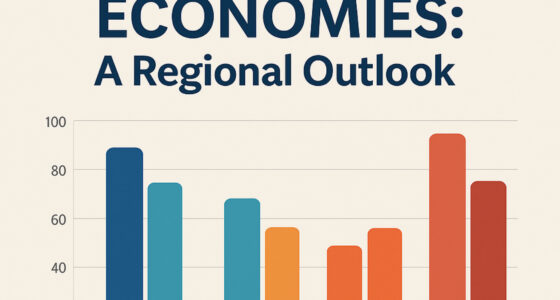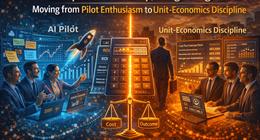A post-work society could be a utopia, dystopia, or simply different, depending on how we adapt. With technology taking over jobs, you’ll find new ways to define purpose, wealth, and community. The shift may bring greater leisure, mental well-being, and social connection, or it might widen inequality and erode social bonds. If you want to explore how these possibilities unfold and what the future might hold, there’s more to discover.
Key Takeaways
- A post-work society could foster greater creativity, community engagement, and well-being, resembling a utopia with new purpose and freedom.
- Automation and resource redistribution may reduce inequality but risk creating economic instability or social dislocation if unmanaged.
- Societal identity shifts challenge traditional structures, potentially leading to dystopian control or fragmentation without strong social cohesion.
- Success depends on equitable policies like UBI and cultural adaptation, making the future society more just and inclusive.
- The society’s nature—utopian or dystopian—ultimately hinges on technological management, social values, and collective willingness to adapt.
Top picks for "post work society"
Open Amazon search results for this keyword.
As an affiliate, we earn on qualifying purchases.
The Technological Foundations of a Post-Work Future

Technological advancements are the key drivers shaping a post-work future, transforming how we produce goods and deliver services. Automation and robotics replace repetitive tasks, boosting efficiency and productivity. AI systems now tackle complex problems and decision-making, roles once reserved for humans. Digital platforms enable virtual labor to connect globally, opening new markets and opportunities. Labor-saving technologies like robotics and AI reduce the need for human workers in many sectors, while intelligent machines operate under harsh conditions for extended periods, fueling economic growth. These innovations not only speed up production but also foster a more connected, flexible workforce. As technology advances, it reshapes industries, creating new possibilities for leisure, societal change, and redefining the very nature of work itself. Advances in digital infrastructure facilitate remote work and global collaboration, further transforming traditional employment models and workplace dynamics. Moreover, the integration of advanced automation in various sectors accelerates the shift toward a more efficient and adaptable economy. Additionally, ongoing research in artificial intelligence ethics ensures that these technological shifts align with societal values and safety standards. The digital transformation of industries also promotes new forms of innovation and economic resilience, enabling societies to adapt more swiftly to change. Incorporating sustainable and eco-friendly technologies will be crucial in ensuring that this transition benefits both society and the environment. Furthermore, understanding the impact of mental health and well-being is vital as society navigates these rapid technological changes, ensuring that human-centered considerations remain central in the post-work era.
Rethinking Wealth and Resource Distribution

How can societies fairly distribute wealth in a future where traditional employment becomes less central? You might consider implementing Universal Basic Income (UBI), providing everyone with a guaranteed income to ensure financial security and support meaningful pursuits. Progressive taxation ensures higher earners contribute more, helping fund social programs and reduce inequality. Wealth caps limit excessive accumulation, preventing the concentration of resources in a few hands. Cooperative ownership empowers workers and communities, promoting democratic control of enterprises. These models work together to create a more equitable society, especially as reliance on jobs decreases. The digital economy also allows for new forms of wealth redistribution, enabling innovative approaches to resource sharing and social support. By focusing on sustainable resource use, fair income distribution, and collective ownership, you can help build a resilient, inclusive economy that supports well-being beyond traditional employment structures. Additionally, integrating home decor solutions such as functional wall organization systems can foster communal spaces that encourage social interaction and shared resource management, reinforcing the principles of collective well-being. Moreover, advancing cost behavior analysis can aid policymakers and organizations in understanding and optimizing resource allocation, ensuring efficient use of funds and support systems. Recognizing the importance of resource management can further enhance these efforts by promoting responsible consumption and environmental sustainability. Exploring personality traits and understanding different social dynamics can also improve community engagement and collaborative efforts toward shared goals. Incorporating financial literacy into education initiatives can empower individuals to participate more effectively in these redistribution models.
Impact on Personal Identity and Societal Roles

As work becomes less central to society, you might find your sense of purpose shifting away from your job. This change prompts you to explore new social identities and redefine how you fit into your community. It’s essential to contemplate how these evolving roles influence your self-esteem and connection to others. Engaging in personal development activities can help you adapt to these societal shifts and foster a sense of fulfillment outside traditional employment. Recognizing the importance of self-care strategies can further support your mental and emotional well-being during this transition. Incorporating adaptation techniques rooted in understanding societal changes can also facilitate smoother transitions into new roles and identities. Exploring financial planning options like annuities can provide stable income sources that support your lifestyle changes during this period. Embracing diverse anime films and animated stories can offer emotional insights and comfort during this period of change.
Redefining Personal Purpose
What happens to your sense of self when work no longer defines your identity? You may find that your personal purpose shifts away from job titles and career achievements toward hobbies, passions, and community involvement. Without work as the main source of fulfillment, you start re-evaluating your life goals, seeking meaning through creativity and self-discovery. This change encourages you to explore new interests and contribute to society in different ways, like volunteering or caregiving. Your identity becomes more rooted in personal growth and social connections. As work becomes less central, you gain mental health benefits, reduced stress, and a stronger sense of well-being. Engaging in mindfulness practices can support this transition by fostering emotional stability and self-awareness. Additionally, understanding the Fokos concept of acceptance can help individuals adapt to these societal shifts more gracefully. Recognizing the importance of personal resilience can further empower individuals to navigate this new societal landscape. Cultivating awareness of aura variations can also aid in understanding your emotional and spiritual states during this transition. Moreover, exploring specialized hair care routines, such as using the best oils for hair growth and thickness, can enhance your overall well-being and confidence during this period of change. Ultimately, redefining your purpose allows you to craft a more holistic view of yourself beyond professional success, fostering a sense of autonomy and self-actualization.
Shifting Social Identities
When work no longer serves as the primary source of social identity, your sense of self can become more fragmented and vulnerable to external pressures. Without employment as a unifying factor, you might see your community and social roles weaken. Imagine:
- Struggling to find new sources of belonging beyond your job.
- Feeling isolated as traditional bonds fade, leaving you at risk of social dislocation.
- Adapting to new identities based on volunteer work, caregiving, or creative pursuits instead of employment.
Your self-perception shifts as societal roles evolve, challenging long-held notions of purpose. You may need to redefine who you are and where you belong, forging connections outside of work to maintain a sense of coherence and community in a changing world.
According to social identity theory, the shift away from work as a central social role can significantly impact individual self-concepts and group affiliations. Additionally, the decline of traditional employment can influence economic stability and access to retirement benefits, impacting long-term security.
New Community Roles
How do new community roles reshape your personal identity and societal responsibilities in a world beyond traditional employment? In a post-work society, you’ll find yourself more involved in volunteer work, community projects, and social groups, which help define your sense of purpose. These roles emphasize contribution through care work, local initiatives, and leadership, shifting focus from job titles to societal value. Your identity might center more on community engagement, lifelong learning, and environmental stewardship. As traditional work fades, you’ll rely on volunteer efforts and local initiatives to foster belonging and social cohesion. This trend reflects the increasing importance of social capital in fostering societal resilience and individual well-being. Additionally, the development of community-driven innovations is expected to play a crucial role in addressing local challenges and enhancing social cohesion. This new landscape encourages personal growth and collective responsibility, making community participation a key component of your identity and societal role, rather than your career.
Economic Models in a World Without Traditional Employment

As automation reduces the need for traditional jobs, you’ll need new ways to distribute wealth and resources. Wealth redistribution strategies, like universal basic income, could become essential to guarantee everyone’s needs are met. Exploring innovative economic frameworks helps you understand how society can function fairly without relying on conventional employment. With the potential for nearly all labor to be automated, society must reconsider how value is assigned and how resources are allocated in a post-work economy.
Wealth Redistribution Strategies
In a post-work society, traditional employment-based income diminishes, making wealth redistribution more crucial than ever for maintaining social stability. You’ll see strategies like: 1. Progressive income taxes, where higher earners pay a larger share, helping fund social programs. 2. Social spending, supporting basic needs and reducing inequality through welfare and public services. 3. Transfer mechanisms, such as direct cash transfers or universal basic income, ensuring everyone has access to resources. These methods aim to balance the reduction in wealth disparities while facing challenges like administrative costs and potential disincentives for wealth creation. Philosophers like Rawls argue that prioritizing the least advantaged benefits society as a whole, even if it slightly shrinks the total economic pie. Wealth transfers include gifts, intergenerational transfers, bequests, and inheritances, which continue to play a role in wealth redistribution even in a post-work context. In a post-work world, effective redistribution becomes essential for social cohesion.
New Economic Frameworks
In a post-work society, traditional employment no longer defines economic contribution, prompting the development of innovative frameworks that prioritize alternative forms of value and ownership. You’ll see models like universal basic income (UBI) and participatory ownership gaining prominence, shifting focus from jobs to collective well-being and shared control. Market-based solutions aim to distribute economic agency without heavy government intervention, leveraging AI and robotics to streamline production and resource management. New metrics are emerging to measure value beyond labor, emphasizing creative, social, and community work. Technology enables decentralized economic participation, allowing you to exercise more agency. These frameworks explore how abundance can be managed, fostering global cooperation and adapting traditional theories to fit a society driven by automation and innovation. Transformational leadership plays a crucial role in guiding societies through these profound changes, ensuring inclusive participation and ethical considerations are upheld.
Social Benefits and Potential Risks of Automation

Automation offers significant social benefits by boosting efficiency, reducing errors, and improving collaboration across teams. Imagine a workplace where repetitive tasks are handled seamlessly, freeing you to focus on strategic projects. Visualize a team communicating effortlessly, empowered by automation tools that foster teamwork. Envision higher job satisfaction as routine burdens fade away. Approximately 60% of companies currently utilize automation tools in workflows (Duke University). Here are three key benefits: 1. Increased productivity, allowing more time for creative and strategic work. 2. Enhanced collaboration, with 90% of IT staff noting smoother cross-team efforts. 3. Higher employee satisfaction, with 88% reporting improved morale. However, risks include job displacement, skills becoming obsolete, and dependence on technology, which require careful management to guarantee a balanced transition.
Navigating Inequality and Ensuring Fairness

Navigating inequality and ensuring fairness in today’s labor markets require addressing complex challenges that persist across the globe. You face disparities in employment opportunities, with millions stuck in informal work and working poverty, especially in less developed countries. Economic growth has slowed, limiting job creation and worsening working conditions, particularly in low-income regions. Within countries, spatial inequalities restrict workers’ ability to access better-paying jobs, and gender gaps, fueled by unpaid domestic work, widen economic divides. Wage inequalities and skill gaps threaten social justice and economic progress. To promote fairness, you need policies that invest in human capital, improve infrastructure, and reduce gender disparities. International cooperation is vital to address global economic obstacles and foster a more equitable labor landscape.
Cultural Shifts and Redefining Purpose

As society shifts away from traditional work roles, you’ll notice new social identities forming around different life pursuits. Communities are redefining their roles, emphasizing shared experiences and collective well-being over individual achievement. This change prompts you to reconsider your own purpose, moving beyond work to find fulfillment in personal growth and community connection.
New Social Identities
Cultural shifts driven by changing work practices are transforming how you define your social identities. As work blends more into personal life, boundaries blur, and your sense of self becomes intertwined with your job. You might imagine:
- Your work as a core part of who you are, especially if you’re college-educated, shaping your social circles.
- Moments of flow at work, where skill and passion merge, fueling your engagement and personal growth.
- Social connections through digital tools, creating new ways to build community but also risking loneliness if boundaries aren’t maintained.
These changes influence how you see yourself and your purpose, often leading to a reevaluation of what gives life meaning beyond traditional work roles. Your social identity evolves in response to technological and societal shifts.
Evolving Community Roles
Community roles are shifting from traditional employment hierarchies to more localized, participatory positions, emphasizing leadership and engagement within neighborhoods and social groups. You find yourself more involved in community service, volunteering, and mentorship programs that guide others. Leadership no longer solely belongs to those in formal jobs but is rooted in collective action and social responsibility. As social capital grows through neighborhood initiatives and events, your interpersonal skills become essential. Collaboration extends beyond workplaces, fostering a sense of shared purpose. Technology plays a key role, enabling remote teamwork and improving access to community resources. Economic value now includes unpaid contributions, shifting the focus toward community-driven projects. In this evolving landscape, your active participation helps shape a society where local bonds and civic engagement redefine what it means to contribute.
Redefining Personal Purpose
In a post-work society, redefining personal purpose becomes essential as traditional employment no longer anchors individual identity. You’ll find your sense of fulfillment shifting toward areas like:
- Engaging deeply in leisure and personal growth, imagining new hobbies and passions.
- Building stronger community ties, creating meaningful social connections.
- Prioritizing well-being over productivity, focusing on mental and physical health.
The cultural landscape changes as technology influences your work-life balance, automation displaces jobs, and values move toward personal fulfillment. Economic adjustments, like basic income, support this shift, while psychological benefits emerge from increased leisure and creativity. Your purpose now revolves around self-discovery, community involvement, and personal development, redefining what it means to live a meaningful life beyond traditional work.
Challenges in Transitioning to a Post-Work Society

What are the biggest hurdles in shifting to a post-work society? First, redefining how people earn and share income is complex. You’ll need new economic systems, like Universal Basic Income, to support everyone without traditional jobs. Technological advances threaten to displace many workers, and skills quickly become outdated, requiring continuous learning. Managing growing inequality is another challenge; if not addressed, it could deepen social divides. Rapid automation demands quick adaptation, but many may lack the skills needed. Ethical concerns about AI and automation impact governance, requiring careful regulation. Socially, work provides identity and purpose, so replacing that isn’t straightforward. Mental health issues and cultural shifts could emerge as society adjusts, making the transition both a technical and emotional hurdle.
Visions of Prosperity and Leisure in the New Paradigm

How might prosperity and leisure look in a post-work society driven by automation? You could experience a shift where routine tasks are handled by intelligent machines, freeing your time for creative pursuits, learning, or volunteering. Imagine a world where:
- You spend your days exploring arts, science projects, or community work, no longer tied to a paycheck.
- Society values contributions in innovation and culture, redefining status beyond traditional careers.
- Societal prosperity increases if wealth is redistributed effectively, making leisure accessible to all.
This new paradigm offers mental health benefits and stronger social bonds, but balancing meaningful activity with free time remains key. As leaders manage human-machine collaboration, your role shifts toward self-fulfillment and community engagement rather than just employment.
Envisioning a Balanced and Equitable Future

Building a fair and balanced post-work society requires rethinking how work and income are shared among everyone. You need systems that promote equitable distribution, considering the effort, duration, and social value of labor. Collective decision-making empowers workers, ensuring their needs and potentials are respected without forcing them into roles against their will. Fair remuneration must reflect not just monetary value but also ethical and ecological considerations. Addressing inequalities caused by automation and digital economies is essential to prevent social unrest and fragmentation. Policies should aim to reduce disparities, strengthen democratic resilience, and foster solidarity. Emphasizing worker autonomy and participatory models helps prevent class domination, creating a society where social, economic, and ecological sustainability coexist. This vision nurtures a future rooted in fairness, inclusion, and shared prosperity.
Frequently Asked Questions
How Will Post-Work Society Address Mental Health and Well-Being?
You might wonder how a post-work society will handle mental health and well-being. In this future, you’ll see more community-based programs and universal access to mental health care, reducing workplace stress and giving you more leisure time. Technology will support your mental health needs, while policies focus on holistic well-being. This shift aims to create a healthier, more balanced society where your mental health is prioritized beyond job demands.
What Role Will Education Play in a Post-Work World?
In a post-work society, you’ll find education shifting focus from job skills to personal growth, emphasizing liberal arts, critical thinking, social skills, and emotional intelligence. You’ll see teachers guiding and mentoring, inspiring lifelong learning and community involvement. Education will promote social mobility, cultural understanding, and innovation, ensuring everyone has equal opportunities. As technology evolves, you’ll benefit from accessible, lifelong learning that fosters fulfillment, creativity, and societal progress beyond traditional employment goals.
How Can We Prevent Technological Unemployment From Increasing Inequality?
Like Icarus flying too close to the sun, unchecked automation risks soaring beyond control, widening inequality. To prevent this, you can support policies that promote retraining, ensuring workers develop new skills. Advocate for social safety nets and fair labor practices, and encourage collaboration between government and industry. By staying proactive, you help create a future where technology uplifts everyone, not just a privileged few.
What Policies Are Needed to Support Those Displaced by Automation?
You need policies that support displaced workers effectively. Invest in education and retraining programs to help you shift into new roles, especially in growing sectors like AI development. Strengthen social safety nets such as unemployment benefits or UBI to provide financial security. Encourage employer-led training to foster human-AI collaboration, and develop clear regulations ensuring ethical AI use. These steps will help you adapt to automation’s changes and maintain economic stability.
How Will Governance Adapt to Manage Resource Redistribution Effectively?
Managing resource redistribution in a changing society calls for clever, collaborative governance. You’ll see organizations shifting to self-governance, combining consensus and competency models to guarantee fairness and foster trust. Technology will turbocharge transparency, while participatory democracy empowers you and others to have a voice. Balancing automation’s efficiency with human values, you’ll help craft adaptable, accountable systems that promote equality, equity, and engagement in this new, post-work landscape.
Conclusion
Imagine a garden where the trees no longer bear fruit out of obligation but because they thrive in harmony. In embracing a post-work society, you have the power to cultivate a landscape of leisure, creativity, and shared prosperity. It’s a bold new orchard—challenging yet full of promise. Your choices today can help nurture this vision, transforming it from a fragile sapling into a flourishing forest, where everyone can truly flourish.









